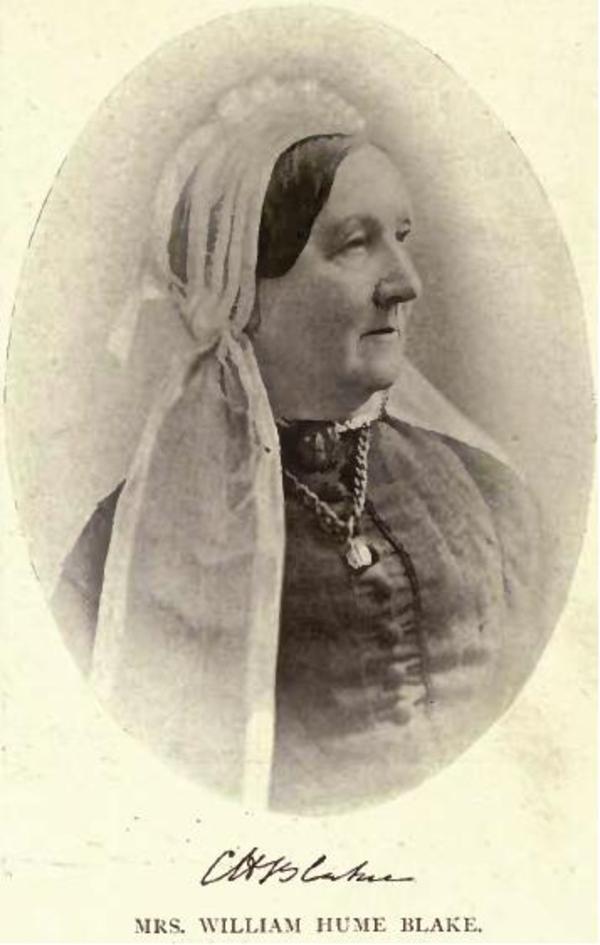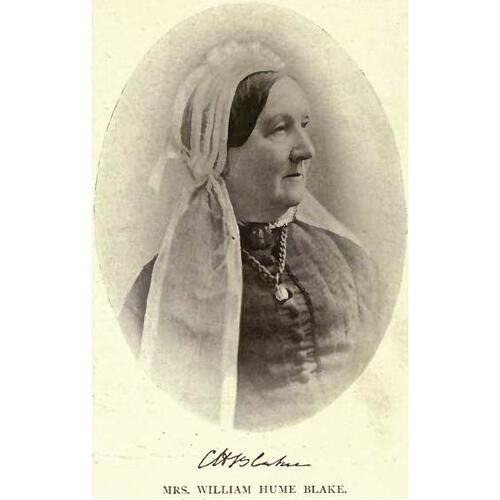
Source: Courtesy of Wikimedia Commons
HUME, CATHERINE HONORIA (Blake), b. 1804 or 1805 at Kiltegan, County Wicklow (Republic of Ireland), daughter of Joseph Samuel Hume; m. in 1832 in Ireland William Hume Blake*, and they had two sons, Edward* and Samuel Hume*, and two daughters; d. 3 Feb. 1886 at London, Ont.
Catherine Honoria Hume, although born into the prosperous landed gentry of Protestant Ireland, enjoyed little of the comfort and elegance of other branches of the Hume family. Her father, the second son of William Hume, a wealthy and influential landowner, inherited only a small portion of the family estates and entered the army in pursuit of a professional career. Catherine was born at the family seat, Humewood, and began her education in Dublin where her father was stationed. After his premature death, however, the family evidently returned to County Wicklow. Despite changing family fortunes, Catherine’s education was genteel and refined. She played the piano and harp, read classical literature in Latin, and was fluent in French and Italian.
In the spring of 1832 she married William Hume Blake, a childhood friend and first cousin who was five years her junior. Only months later they immigrated to Canada as part of an impressive group of relatives and friends, dominated by clergymen lured by the prospect of better appointments with the Church of England in Upper Canada. Hume Blake, still unsettled about a career, accompanied his elder brother Dominick Edward* to Adelaide Township, Middlesex County, in 1833, where he settled at Bear Creek, near Strathroy, in the hope of becoming a gentleman farmer. But Catherine soon tired of the drudgery of pioneer life and according to family legend confronted Hume, questioning whether the hands of her newly born son Edward had no greater future than to become as calloused and weather-beaten as his father’s. In 1835 at Catherine’s insistence the Blakes moved to Toronto.
After Hume Blake’s enrolment as a student-at-law, Catherine operated a private girls’ school to supplement the family’s income. Following Hume’s admission to the bar in 1838, she transferred her abundant energies to charitable societies, and then to the support of Hume’s diverse interests in legal reform, education, and politics. Catherine played an influential and frequently decisive, albeit private, role in Hume’s flourishing career, and in the 1850s, when Hume’s health deteriorated and he was forced to resign positions of influence and prestige, she asserted her dominant role as the Blake matriarch. Throughout the 1860s she accompanied Hume on frequent trips abroad in search of healthier climates. After his death in 1870, she resided chiefly in London, Ont., at the home of her elder daughter, Sophia Cronyn, where she died in 1886 as a result of injuries sustained in a fall.
Catherine Blake was motivated by an uncompromising evangelical Christian faith which had mixed effects on her offspring. Edward did not share his mother’s emotional commitment to Christianity, and was chronically depressed by a sense of guilt often reinforced by her stern admonitions. Samuel, however, became a devout and equally uncompromising leader of Toronto’s low church faction of the Church of England. As well as playing an integral role in the education of her children, even after they had been enrolled in private schools, Catherine also instilled in them the desire to attain in Canada the status which her branch of the Hume family had lost in Ireland. Edward, especially, bore the burden of his family heritage and strove to achieve goals which Catherine had once set for her husband. Many of the ambitions of William Hume, Edward, and Samuel can be traced to the influence of Catherine Blake.
In one sense, Catherine Blake was the archetypal wife of a successful Victorian businessman and politician. She ran an efficient household and belonged to the proper charitable and religious societies, while remaining unobtrusively off the stage of public events. In another sense, however, Catherine’s life demonstrated the tensions inherent in a social role which provided 19th-century women with little hope of fulfilling their aspirations. Denied a meaningful career she transferred her ambitions to her husband, and, after his chronic illness, to her sons. Strong-willed, intelligent, and ambitious, Catherine Blake was a domineering mother whose family provided her main source of self-fulfilment.
Writings by Catherine Hume Blake were published as “The riots of 1849 in Montreal,” CHR, 15 (1934): 283–88; and “Edward Blake: a portrait of his childhood,” ed. M. A. Banks, Profiles of a province: studies in the history of Ontario . . . (Toronto, 1967), 92–96.
AO, MU 136–273. MTL, Robert Baldwin papers. J. D. Livermore, “Towards ‘a union of hearts’: the early career of Edward Blake, 1867–1880” (phd thesis, Queen’s Univ., Kingston, Ont., 1975); “The personal agonies of Edward Blake,” CHR, 56 (1975): 45–58.
Cite This Article
J. Daniel Livermore, “HUME, CATHERINE HONORIA (Blake),” in Dictionary of Canadian Biography, vol. 11, University of Toronto/Université Laval, 2003–, accessed April 28, 2025, https://www.biographi.ca/en/bio/hume_catherine_honoria_11E.html.
The citation above shows the format for footnotes and endnotes according to the Chicago manual of style (16th edition). Information to be used in other citation formats:
| Permalink: | https://www.biographi.ca/en/bio/hume_catherine_honoria_11E.html |
| Author of Article: | J. Daniel Livermore |
| Title of Article: | HUME, CATHERINE HONORIA (Blake) |
| Publication Name: | Dictionary of Canadian Biography, vol. 11 |
| Publisher: | University of Toronto/Université Laval |
| Year of revision: | 1982 |
| Access Date: | April 28, 2025 |



